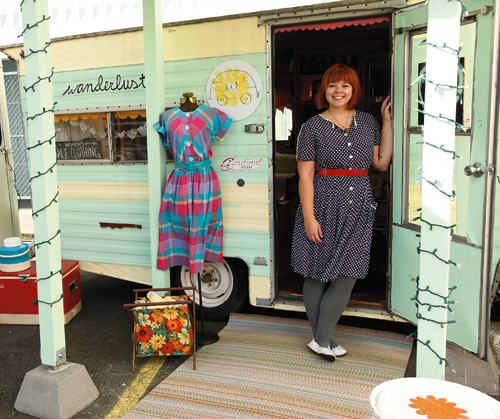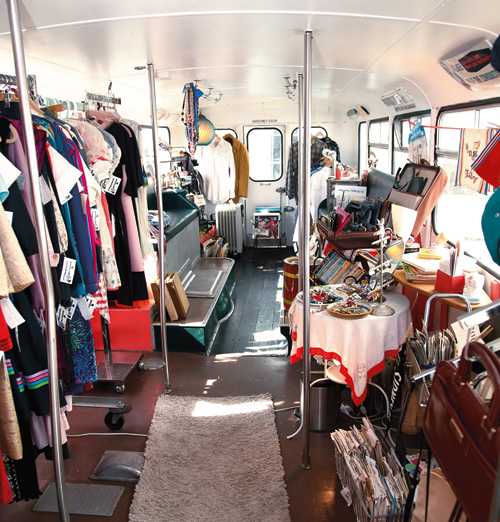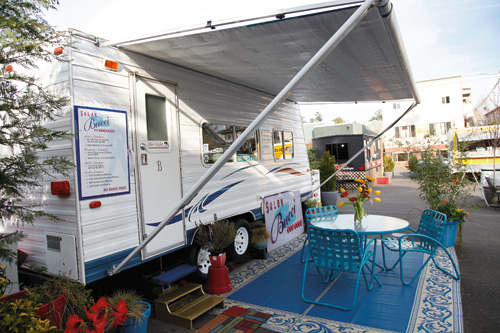 The low-overhead food cart model spreads to other businesses.
The low-overhead food cart model spreads to other businesses.
BY CHRISTINA COOKE
 |
Erin Sutherland has found operating a vintage dress shop in a 1965 Bristol Lodekka double-decker bus attracts more attention than a traditional storefront would. “It creates an intimate retail setting customers don’t get anywhere else,” she says.// Photo by Alexandra Shyshkina |
When Erin Sutherland first opened Lodekka, a vintage dress shop in a double-decker bus in Northeast Portland, she had to coax passersby accustomed to food cart protocol to come on board.
“People are trained that they stand outside of a cart and get something from inside,” Sutherland says. “It took us a long time to help customers overcome their discomfort and cross the threshold.”
Now sharing a parking lot on North Williams Avenue with the vintage and handmade goods cart Wanderlust, Lodekka enjoys a steady stream of customers who seem to have no qualms about jumping aboard.
Emboldened by the success of Portland’s close to 700 food carts, a growing number of entrepreneurs are applying the cart model to their non-food businesses. Within the last year and a half, a hair salon cart (Salon Bucci, Southeast 50th and Division), a bike repair cart (The Bike Rack, Southeast 82nd and the Springwater Corridor) and several vintage clothing carts (Lodekka and Wanderlust; Yours Vintage Treasures, Southeast 52nd and Foster) have set up shop throughout Portland, most near existing food cart pods.
 |
Lisa Marie Bucci runs Salon Bucci, a movie-set-themed hair salon cart, in the Food Pavilion near Southeast 50th and Division. Finding her next meal is never a problem, she says. “I’m just waiting for a massage trailer to move in next door to me.”// Photo by Alexandra Shyshkina |
The city requires that non-food cart owners follow standard procedure when setting up their businesses: They must register, attain vending permits, pay city and county business license and income taxes, and follow zoning and building codes. But since they don’t have to pass health inspections like their counterparts in the food industry, no government bureau keeps watch over them — or has an idea how many exist.
Loren Guerriero, community outreach coordinator at Mercy Corps Northwest, says the market has yet to determine whether the cart model is viable for non-food enterprises.
“A lot of these new non-food carts have yet to be tested,” he says. “The majority of businesses fail within the first three years, and many of these carts started in the last three years.”
Owners cite the desire to stand out in a market saturated by the same types of businesses as a primary reason for going mobile.
“I wanted a hook,” says stylist Robin Carlisle, who opened the Holiday Hair Studio salon last March in a pink and silver Kenskill trailer on Southeast 28th. “I thought if you can do food in a cart, you can do hair in a cart.”
Her scheme worked: the novelty of the hair-in-a-cart idea attracted the attention of publications ranging from the Portland Mercury to New York magazine to the Apartment Therapy design blog, and within eight months, she’d amassed 200 regular clients — a feat that would have otherwise taken four to five years.
In February, Carlisle moved into a brick-and-mortar salon half a block from her former parking spot. “Having the cart first was the only way I would ever be able to have a full-on salon like I have now,” she says.
 |
Wanderlust co-owner Vanessa Lurie has to select her merchandise carefully, because only 115 hangers fit inside the vintage goods cart she runs beside Lodekka on North Williams Avenue. “The space inside my shop is a challenge I have to overcome everyday,” Lurie says.// Photo by Alexandra Shyshkina |
Other non-food cart owners say they enjoy carthood and have no aspirations for more permanent locations. They appreciate the low overhead and high visibility, the sense of community within the food pods and the quirkiness and intimacy of their spaces. “There are times when customers will stay for two hours, just chatting,” Sutherland says.
But everything is harder in a cart, owners agree. Arranging electricity and water hookups, keeping out the cold and rain, managing a small space and finding ways to grow all present challenges. Plus, business suffers during the winter months, when foot traffic to the cart pods dies down.
“I still don’t know if I’ll make it,” says Sonya Petroff, who opened Yours Vintage Treasures last May. “But this is my dream. I’m willing to hang in there.”


